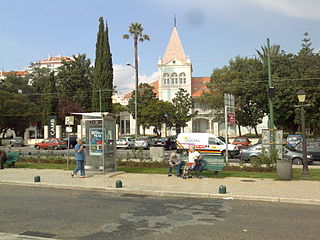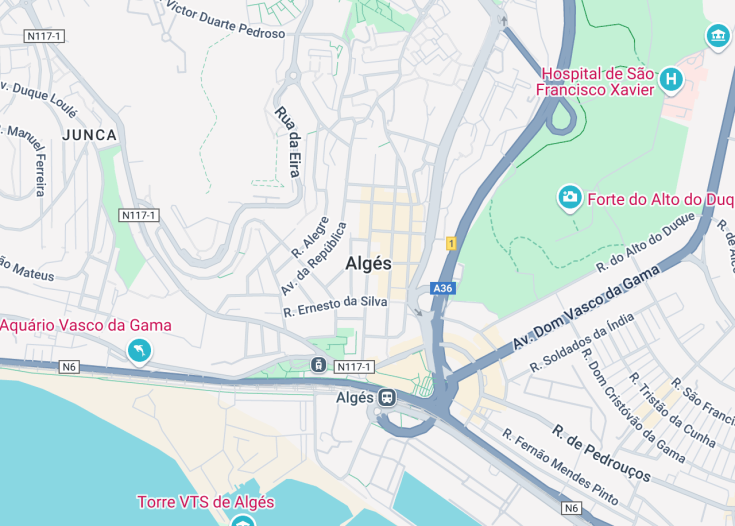Algés, a picturesque coastal town in Portugal, offers a charming blend of historical richness and modern convenience. Nestled close to the capital, Lisbon, Algés provides a peaceful escape with its beautiful beachfront, lush parks, and vibrant cultural scene, including the acclaimed Berardo Collection Museum. The town is also known for its delightful culinary offerings and traditional festivals, making it an ideal destination for those seeking both relaxation and rich cultural experiences in a serene setting.
For an unforgettable experience, visit the Algés Market on a Saturday to enjoy fresh local produce and traditional Portuguese crafts.
Don’t miss a walk along the Algés Riverfront, where you can enjoy stunning sunsets and tranquil sea views.
Top things to do & see in Algés
Select the following sights and activities to discover best tickets and tours available in Algés.
Algés: A Gateway to Lisbon’s Coastal Charms
| Country | Portugal |
| Time in Alges | GMT+1 |
| Language spoken | Portuguese |
| Population | 15,177 (INE data 2021) |
| Currency | Euro (€, EUR) |
| Airports |
Located just west of Lisbon, Algés is a scenic parish in the Oeiras municipality that seamlessly blends historical charm with coastal allure. Situated along the northern bank of the Tagus River, Alges acts as a serene gateway to the vibrancy of Lisbon while retaining its unique local spirit.
Once known for its agricultural prominence, Alges today is a bustling community known for its beautiful beaches, maritime activities, and cultural sites. The area has undergone significant urban development over the years, transitioning from lush farmlands to a more residential and tourist-oriented locale.
The heart of Alges is its market town feel, characterized by quaint streets, traditional Portuguese architecture, and the bustling Alges Market where locals and visitors alike gather to procure fresh produce and local goods. Cultural enthusiasts enjoy the Manuel de Brito Art Gallery housed in Palacio Anjos, a historic palace offering a dive into contemporary Portuguese art.
For those seeking relaxation and leisure, the Alges Beach offers a splendid seaside escape with facilities for watersports and pristine views across the Tagus. The promenade along the river is perfect for afternoon strolls, cycling, or just watching the sunset.
With Lisbon just a stone’s throw away, Alges provides a quieter alternative to the capital’s hustle and bustle but retains easy access to major urban benefits like shopping, dining, and entertainment. Additionally, its strategic location next to major transport hubs including the nearby Humberto Delgado Airport ensures Alges remains a convenient base for both international travelers and locals commuting to the city.
Where is Algés?
Algés is located in the Oeiras municipality, mere miles west of Lisbon along the northern shores of the Tagus River.
Distances:
| Route | Distance by Car | Time by Car |
|---|---|---|
| Lisbon to Alges | 9 miles | 20 minutes |
| Porto to Alges | 197 miles | 3 hours |
| Algarve to Alges | 180 miles | 2 hours 40 minutes |
What is Algés famous for?
Alges is noted for its local market, artisan shops, proximity to Lisbon, and its serene riverfront areas, making it a charming destination amidst the bustling Greater Lisbon region.
History
Prehistoric Times – Ancient Origins
Algés, a picturesque locale nestled in Portugal, boasts a history that stretches back to prehistoric times. Archaeological findings, including tools and pottery, suggest that the area was inhabited by various tribes, who utilized the fertile lands and proximity to the Tagus River. These early inhabitants laid the groundwork for the development of Alges, weaving a rich historical tapestry that spans several millennia.
Roman Era – Foundational Growth (1st century BC to 5th century AD)
The Roman conquest of the Iberian Peninsula brought significant changes to Alges. The region was strategically important for its resources and as a transit point for goods traveling via the Tagus. The Romans introduced advanced agricultural techniques, road systems, and architecture, remnants of which can still be observed in the city’s layout and some archaeological sites. This period marked a pivotal era of growth and development for Alges, embedding it more firmly on the map of historical significance.
Middle Ages – Fortification and Feudalism (8th century to 15th century)
During the Middle Ages, Alges saw a mix of conflict and cultural exchange, particularly during the Moorish occupation and the subsequent Reconquista. This era saw the construction of fortifications, some of which still stand, and the establishment of a feudal system under which land was cultivated and defended. The religious and cultural diversity of this period left a lasting mark on the region’s architectural and societal structures.
Age of Discoveries – Prosperity and Expansion (15th century to 17th century)
The Age of Discoveries, for which Portugal is renowned, had profound impacts on Alges. Positioned near Lisbon, Alges became a supporting point for maritime exploration. Local shipyards contributed to building vessels that would explore new worlds. This period brought economic prosperity and an influx of wealth and ideas from abroad, enhancing Alges’ cultural landscape.
Modern Era – Development and Urbanization (20th century to Present)
In the 20th century, Alges transformed from a mainly agricultural society to a more urbanized and industrially developed area. This shift included the development of residential areas, modern infrastructure, and transport systems, aligning Alges with greater Lisbon’s growth. Today, it merges its rich historical past with a vibrant, modern lifestyle, making it a unique place to explore the layers of Portuguese history and development.
Visit Algés
What to see and do in Algés, Portugal.
Alges offers a blend of historical sites and modern attractions. Visitors can explore ancient ruins and fortifications, testimony to its Roman and medieval past. The Alges Market, with its vibrant atmosphere and local products, provides a taste of local life. For leisure, the waterfront along the Tagus River provides scenic walking and cycling paths, ideal for enjoying the stunning views of the nearby Belém area.
- Visit the Alges Church, an architectural gem.
- Stroll along the riverfront, perfect for evening walks.
- Explore local cuisine at Alges Market.
Festivals and Events in Algés
Alges hosts several cultural and recreational events throughout the year, which are great opportunities to experience local traditions and hospitality. The Alges Fest, typically held in summer, features music, dance, and food stalls, drawing both locals and tourists. The annual Arts and Crafts Fair, every autumn, showcases local artisans and their work, offering unique souvenirs and gifts.
Best time to visit Alges
The best time to visit Alges is during spring and early summer (April to June), when the weather is pleasantly warm, and the tourist crowds are smaller than in peak summer. This period also coincides with some local festivals, providing visitors with a chance to experience Alges’ vibrant cultural scene.
Is Algés worth visiting?
Alges is undoubtedly worth visiting for its rich historical heritage, scenic landscapes, and vibrant local culture. The blend of ancient and modern attractions, coupled with its proximity to Lisbon, makes it an ideal destination for those looking to explore beyond the typical tourist paths and delve into the authentic Portuguese way of life.










